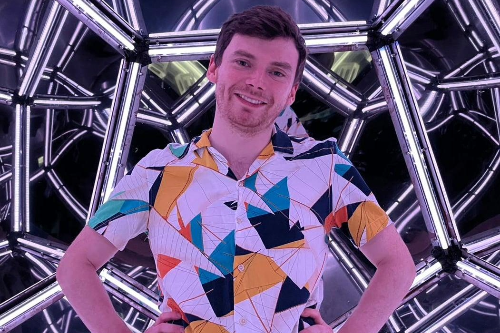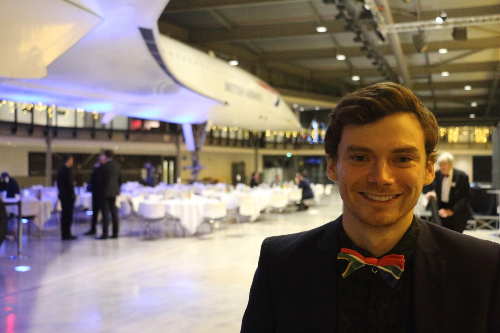Franco Labia believes the space industry is a decade or two behind the rest of the world on diversity – especially LGBTQ+ representation.
Franco, who identifies as non-binary and bisexual, describes the charity they founded, Space Pride, as a “joyful protest” aimed at effecting change and bringing together the LGBTQ+ community in the international space sector.
“The lack of any visible LGBTQIA+ community made me feel like there wasn’t a place for me in the international space industry,” said Franco, who is studying for a robotics PhD at the University of Bristol.
“Currently, space is very much an elite old boys club and without diverse voices in the global space sector, it will be a tool for the few, rather than the many.”
Franco says that the queer community “faces a lot of discrimination” in the space industry. They cite multiple accounts of queer colleagues struggling to break into the sector and a lack of LGBTQ+ senior leaders. The situation is not helped by space conferences being held in countries with homophobic laws, Franco said.
The 2020 Space Census found that while LGBQ+ workers were well represented in the space industry, a quarter of them did not feel comfortable being open about their sexuality. The same proportion of trans employees were not comfortable being open about their gender transition. It also found that women make up 29% of the workforce.
Meanwhile, an EU report on the defence, aeronautics and space industries found a “lack of diversity among employees, primarily in terms of sexual orientation, religious backgrounds and disabilities”. It found that nearly half (45%) thought their employer did not treat their staff equally.
Space Pride plans to tackle that discrimination through social science research, community building and outreach.
Franco, who is from South Africa, said: “The dream is to create a cultural shift in the global space sector and wider society to one that is more inclusive, progressive and one where all are welcome. Humanity is diverse as a species, and it’s about time the space sector reflects that in their senior leadership.”
Space Pride’s motto is ‘We Are All Made Of Stardust’, based on the fact that nearly all elements that make up the human body are created in stars.
And that motto will be on display at the Space Pride Fashion Gala, held in Milan during the International Astronautical Congress, at the MEET Digital Culture Center on October 16 2024.
Organised by Franco and their Space Pride team, it is described as a “diverse and boundary-breaking” pride parade and fashion show, which will be “a fusion of art, culture and technology on the cutting-edge of human curiosity and exploration”.
Franco is based at Bristol Robotics Laboratory, which is jointly run by the University of Bristol and UWE Bristol. They research how to detect life in caves on Earth and in space using swarms of robots. Once graduated they want to “work on innovative space missions to explore worlds and moons we’ve never seen before”.
Tracy Brunnock, Head of Equity, Diversity & Inclusion at the University of Bristol, said: “Franco’s commitment to effecting change and improving diversity is really commendable. We wish them the best of luck with their fashion gala extravaganza!”
Tickets will be available on the Space Pride website. Organisations wishes to support the fashion gala should also visit the website.

